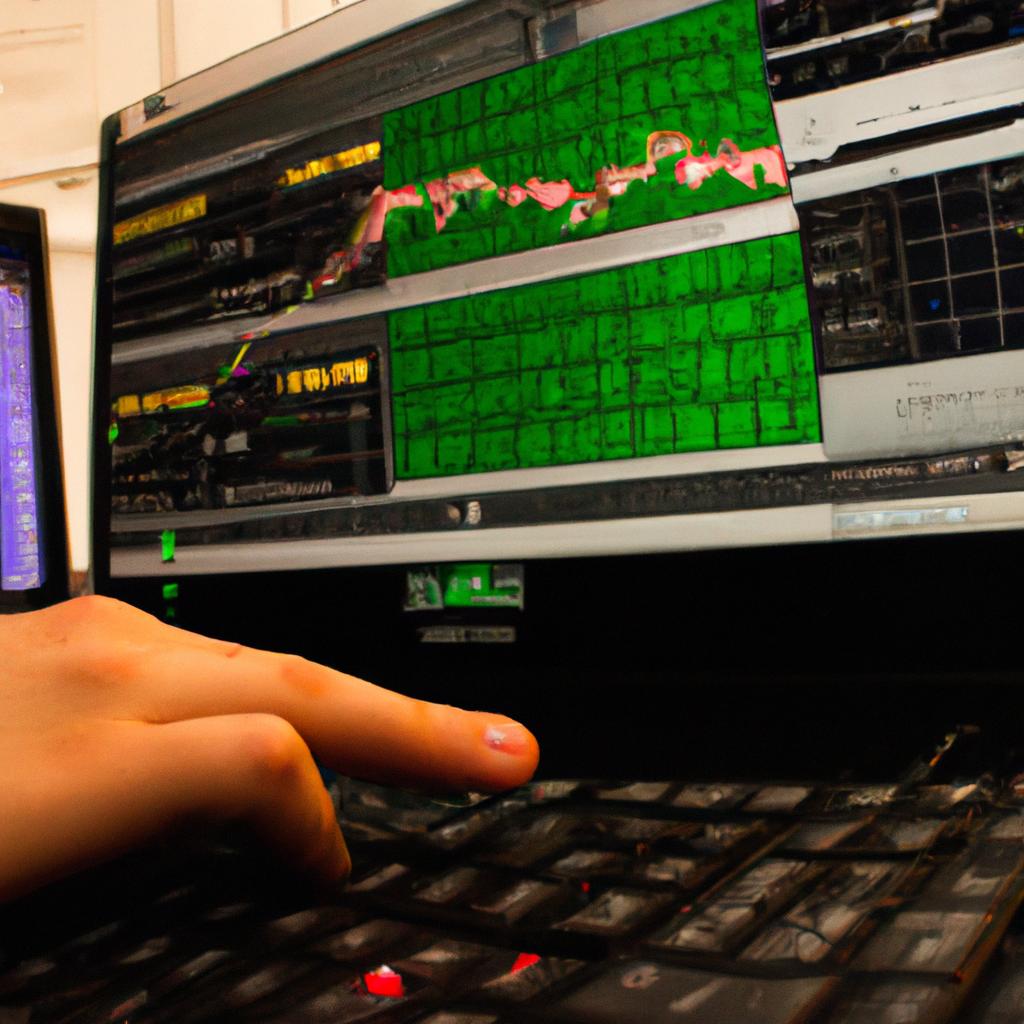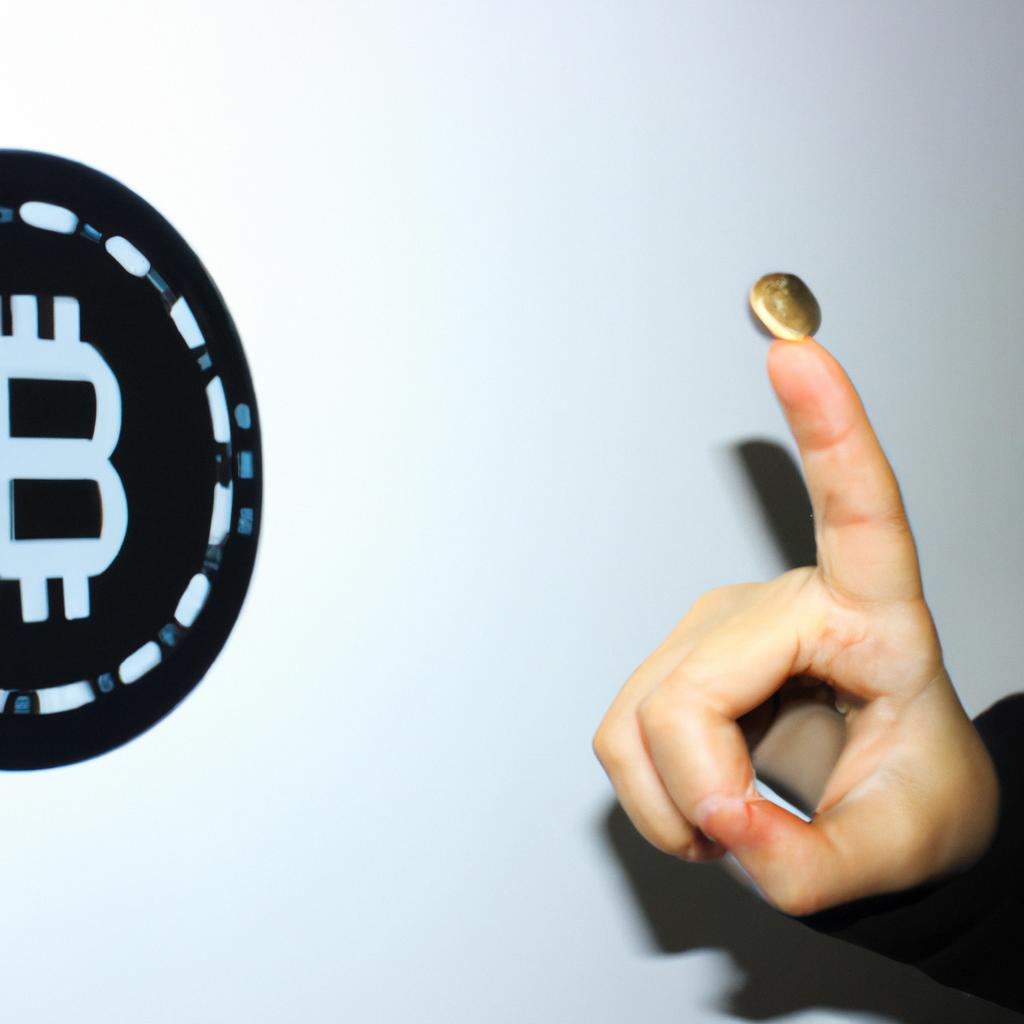In the world of online gaming, virtual economies have emerged as a fascinating and complex phenomenon. These virtual economies are driven by in-game currencies, which serve as the medium of exchange for various transactions within the game. This article explores the intricate dynamics of these in-game currencies and their role in shaping virtual economies.
One example that highlights the significance of in-game currencies is the popular massively multiplayer online role-playing game (MMORPG) World of Warcraft (WoW). In WoW, players engage in quests and battles to earn gold, which acts as the primary currency within the game. With this gold, players can purchase weapons, armor, potions, and other valuable items from non-player characters or trade with other players. The availability and scarcity of certain items determine their market value within WoW’s virtual economy.
Virtual economies in online games present unique challenges for both developers and players alike. Developers must carefully design systems that balance the supply and demand of in-game currencies to prevent hyperinflation or deflation. Players must navigate these virtual economies strategically to accumulate wealth and improve their gameplay experience. Understanding how these virtual economies operate not only sheds light on the intricacies of digital worlds but also has real-world implications for economic theory and practice.
By examining case studies like World of Warcraft, researchers and economists can gain insights into the factors that influence the value of in-game currencies. For example, studying WoW’s virtual economy can provide valuable information on how supply and demand dynamics, player behavior, and game updates impact the prices of items within the game.
Furthermore, analyzing virtual economies like WoW’s can also have practical applications beyond gaming. In recent years, there has been a rise in the popularity of virtual currencies such as Bitcoin. By studying the mechanics of in-game currencies and their role in shaping virtual economies, economists can apply this knowledge to better understand real-world cryptocurrencies and their economic implications.
In conclusion, exploring the complexities of in-game currencies and virtual economies offers a unique perspective on digital worlds and their impact on economic theory. The case study of World of Warcraft provides valuable insights into supply-demand dynamics, player behavior, and market equilibrium within an online gaming environment. This research not only advances our understanding of virtual economies but also has broader implications for real-world economic systems.
Types of in-game currencies
Types of In-Game Currencies
In the vast world of online games, players often encounter various types of in-game currencies that serve as a means of exchange within the virtual economies. These currencies play a crucial role in enhancing gameplay experiences and facilitating player interactions. Understanding the different forms of in-game currencies is essential for both game developers and players alike.
To illustrate this concept, let us consider an example from the popular MMORPG (Massively Multiplayer Online Role-Playing Game) “World of Warcraft.” Within this virtual universe, players can acquire gold coins by completing quests, defeating enemies, or selling valuable items to non-player characters (NPCs). Gold serves as the primary currency in World of Warcraft’s economy, enabling players to purchase equipment, consumables, and other desirable goods from vendors or other players.
The existence of multiple types of in-game currencies adds depth and complexity to virtual economies. Here are four common categories:
- Primary Currency: This refers to the main form of currency accepted universally throughout the game world. It is typically earned through various activities such as quest completion, monster hunting, or trading with NPCs.
- Premium Currency: Often obtained through real-world purchases or limited-time events, premium currencies provide additional benefits like exclusive cosmetic items or shortcuts to progress faster in the game.
- Faction-specific Currency: Some games introduce faction-specific currencies tied to specific factions within their lore. Players earn these unique currencies by completing tasks assigned by those factions and can spend them on specialized rewards offered exclusively by each faction.
- Event-based Currency: Games frequently host seasonal or time-limited events during which event-based currencies become available. Players participate in special activities related to these events to collect this temporary currency and exchange it for exclusive rewards.
Table 1 below summarizes these different types of in-game currencies:
| Type | Description |
|---|---|
| Primary Currency | The main currency accepted universally within the game world, earned through various activities. |
| Premium Currency | Obtained through real-world purchases or limited-time events, providing benefits like exclusive cosmetic items or shortcuts to progress faster. |
| Faction-specific Currency | Tied to specific factions in the game’s lore, earned by completing faction-related tasks and exchanged for specialized rewards from those factions. |
| Event-based Currency | Acquired during seasonal or time-limited events, allowing players to obtain unique rewards available only for a limited period of time. |
Understanding the different types of in-game currencies provides insight into the underlying mechanics that drive virtual economies in online games. The next section will explore how these currencies play a crucial role in player progression and overall gameplay experiences.
Role of In-Game Currencies in Player Progression
Now that we have examined the various forms of in-game currencies, it is important to delve deeper into their significance within the realm of player progression.
Role of in-game currencies in player progression
Types of in-game currencies play a crucial role in shaping the virtual economies within online games. As we have discussed previously, these currencies serve as mediums of exchange, allowing players to acquire various items and services within the game world. In this section, we will delve deeper into the different types of in-game currencies commonly found in online games.
One example of an in-game currency is gold coins, which are prevalent in many fantasy-themed MMORPGs (Massively Multiplayer Online Role-Playing Games). Players can earn gold coins by completing quests, defeating monsters or selling items to non-player characters (NPCs) within the game. These gold coins can then be used to purchase weapons, armor, potions, and other valuable resources that aid players in their adventures.
The types of in-game currencies vary across different genres of online games. Here are some common examples:
- Credits: Often used in sci-fi or futuristic settings, credits are a form of digital currency that allows players to buy technology-related items like spaceships or advanced weaponry.
- Gems or Crystals: Found primarily in mobile games, gems or crystals are typically obtained through gameplay achievements or real money purchases and can be exchanged for power-ups, extra lives, or exclusive cosmetic upgrades.
- Tokens: Frequently utilized in arcade-style multiplayer games such as fighting or racing games, tokens are earned through winning matches and can be redeemed for additional game rounds or special abilities.
- Reputation Points: Commonly seen in social simulation games like The Sims series or Animal Crossing franchise, reputation points represent a player’s standing within the virtual community and unlock new features or interactions with other characters.
To further illustrate the diversity of gaming currencies, consider the following table:
| Game Title | Currency Name | Purpose |
|---|---|---|
| World of Warcraft | Gold | Purchasing equipment and consumables |
| League of Legends | Riot Points | Unlocking new champions and skins |
| Fortnite | V-Bucks | Buying cosmetic items and battle passes |
| Animal Crossing: New Horizons | Bells | Purchasing furniture, clothes, and tools |
Understanding the different types of in-game currencies enhances our appreciation for the complexities of virtual economies. These systems are carefully designed to motivate players to engage with the game’s mechanics while providing a sense of progression and reward. In the subsequent section, we will explore how players can earn these in-game currencies through various gameplay activities.
Earning in-game currencies through gameplay activities allows players to fully immerse themselves in the virtual world while reaping tangible rewards. Let’s now take a closer look at the methods by which players can accumulate wealth within online games.
Earning in-game currencies through gameplay activities
Building upon the crucial role of in-game currencies in player progression, this section explores how players can earn these virtual assets through various gameplay activities. By engaging with specific game mechanics and completing tasks within the virtual world, players have the opportunity to accumulate wealth and enhance their gaming experience.
Earning In-Game Currencies:
One common method for players to earn in-game currencies is by participating in quests or missions provided by the game developers. These quests often involve completing certain objectives, such as defeating enemies, collecting items, or solving puzzles. As an example, let’s consider a popular fantasy MMORPG where players embark on a quest to retrieve a rare artifact from deep within a treacherous dungeon. Upon successful completion of this challenging task, they are rewarded with a significant amount of in-game currency.
Furthermore, some games introduce mini-games or side activities that offer unique opportunities for currency acquisition. For instance, players may be able to participate in virtual gambling establishments within the game world, such as casinos or betting arenas. Engaging in these activities provides an additional avenue for earning valuable in-game coins or tokens.
To further incentivize engagement, many games also implement daily login rewards and achievement systems. By logging into the game regularly or accomplishing specific milestones, players receive bonus currencies as a token of appreciation for their dedication and progress. This strategy not only encourages player retention but also fosters a sense of accomplishment and satisfaction.
In addition to these methods, certain multiplayer online games feature trading systems that allow players to exchange goods and services directly between themselves. Through bartering or marketplace transactions facilitated by the game’s interface, individuals can acquire desired resources using their earned currencies while simultaneously fostering social interactions within the gaming community.
- Sense of fulfillment when successfully completing challenging quests
- Excitement when encountering unexpected opportunities for currency accumulation
- Pride when achieving milestones and receiving rewards
- Satisfaction when engaging in virtual economies and trading with other players
Emotional Table:
| Emotion | Description |
|---|---|
| Joy | Players experience happiness upon gaining significant wealth. |
| Anticipation | The prospect of obtaining rare or valuable items generates excitement. |
| Accomplishment | Earning in-game currencies through gameplay activities boosts confidence and pride. |
| Gratitude | Players feel grateful when rewarded for their dedication and achievements. |
With various methods available to earn in-game currencies, the next section will delve into another aspect of virtual economies – purchasing these assets using real money. By exploring this avenue, players can gain a deeper understanding of the relationship between virtual economies and the broader gaming industry.
Purchasing in-game currencies with real money
Building upon the concept of earning in-game currencies through gameplay activities, another common method of acquiring virtual wealth within online games involves purchasing in-game currencies directly using real money. This practice has become increasingly prevalent in recent years and presents both advantages and disadvantages for players.
Purchasing in-game currencies with real money provides a shortcut for players to acquire virtual wealth without investing significant time and effort into gameplay activities. For example, imagine a player who is eager to upgrade their character’s equipment in an online role-playing game but lacks the necessary in-game currency. Instead of grinding through countless quests or engaging in repetitive tasks, they can simply purchase the desired amount of currency through microtransactions. This convenience appeals to many players who may have limited gaming time or prefer to focus on other aspects of gameplay.
However, it is important to acknowledge that this practice also raises concerns regarding fairness and game balance. Here are some key points to consider:
- Pay-to-win dynamics: In certain games, the ability to purchase in-game currency can create an uneven playing field where those with deeper pockets gain a significant advantage over free-to-play players.
- Impact on game economy: The introduction of external monetary transactions can disrupt the natural flow of the in-game economy, potentially leading to inflation or deflationary pressures.
- Ethical considerations: Some argue that selling virtual goods for real money blurs the line between gaming as entertainment and gambling-like behavior, particularly when loot boxes or randomized rewards are involved.
- Exploitative practices: There have been instances where players feel exploited by developers who intentionally design gameplay mechanics that push individuals towards making additional purchases.
To further illustrate these concerns, consider the following table showcasing contrasting perspectives on purchasing in-game currencies:
| Pros | Cons |
|---|---|
| Convenient | Unfair advantage |
| Time-saving | Disrupts game economy |
| Supports developers | Ethical concerns |
| Accessibility | Potential exploitation |
In light of these considerations, it is evident that the option to purchase in-game currencies with real money has both benefits and drawbacks. The implications of this practice on game balance will be explored further in the subsequent section, which delves into how in-game currencies can impact gameplay dynamics and overall player experience.
Understanding the potential consequences of purchasing virtual wealth allows us to delve deeper into the implications of in-game currencies on game balance. By examining various perspectives and analyzing specific case studies, we can gain insights into how these digital economies shape the gaming landscape.
Implications of in-game currencies on game balance
Section: Implications of in-game currencies on game balance
In online games, the presence of in-game currencies has far-reaching implications for the overall game balance. These virtual economies can greatly influence gameplay dynamics, player interactions, and even shape the long-term success of a game. By examining these implications, we gain insights into how in-game currencies impact the gaming experience.
To illustrate this point, let’s consider an example from a popular multiplayer role-playing game (RPG), where players can purchase in-game currency using real money. In this hypothetical scenario, some players opt to spend significant amounts of real money to acquire large quantities of in-game currency. As a result, they gain access to powerful items and advantages that give them an unfair advantage over other players who do not or cannot invest real money into the game.
One implication of such imbalances is the potential erosion of fair competition within the game environment. This creates frustration among non-paying or less financially able players who find themselves at a disadvantage solely due to their inability or unwillingness to spend additional funds on in-game purchases. Consequently, this may lead to reduced player engagement and retention as fairness becomes compromised.
The consequences extend beyond individual player experiences; they also have wider economic ramifications within the virtual world. Here are four key impacts:
- Inflation: The influx of purchased in-game currencies can disrupt the economy by devaluing existing resources and driving up prices.
- Power disparity: Players with greater financial means can dominate others through superior equipment obtained via paid transactions.
- Undermining skill progression: The availability of instant benefits diminishes the sense of achievement derived from working hard and earning rewards through gameplay skill alone.
- Pay-to-win perception: When payers have an undue advantage over non-payers, it fosters negative perceptions about fairness and potentially discourages new players from joining.
| Economy Impact | Positive | Negative |
|---|---|---|
| Inflation | – | ✅ |
| Power disparity | – | ✅ |
| Skill progression | – | ✅ |
| Pay-to-win perception | – | ✅ |
Considering these implications, game developers face the challenge of striking a delicate balance between monetization and maintaining an enjoyable gaming experience for all players. The next section will delve into how in-game currencies can influence player behavior within online games, shedding light on additional aspects to consider when designing virtual economies.
[Transition sentence] Moving forward, it is important to explore the impact of in-game currencies on player behavior and their subsequent effects on the overall gaming ecosystem.The impact of in-game currencies on player behavior
Section Title: The Impact of In-Game Currencies on Player Behavior
Having explored the implications of in-game currencies on game balance, it is crucial to understand their impact on player behavior. By analyzing how virtual economies influence players’ actions and decision-making processes, we gain valuable insights into the psychology behind engaging with these systems.
Player Behavior and In-Game Currencies:
To illustrate the influence of in-game currencies on player behavior, let us consider a hypothetical scenario set within an immersive multiplayer online role-playing game (MMORPG). In this game, players can earn gold coins through completing quests or selling items obtained during gameplay. These gold coins serve as the primary in-game currency for purchasing equipment, consumables, and other desirable virtual assets.
- Feelings of accomplishment arise when players successfully accumulate a significant amount of in-game currency.
- Frustration may occur if acquiring large amounts of currency becomes excessively time-consuming or difficult.
- Excitement emerges when players discover new ways to optimize their earning potential within the virtual economy.
- Anxiety arises when facing decisions regarding spending or investing their hard-earned currency wisely.
The Influence of In-Game Currencies Table:
| Positive Influences | Neutral Influences | Negative Influences |
|---|---|---|
| Sense of progression | Currency stability concerns | Potential exploitation |
| Motivation to engage | Resource allocation dilemma | Real-world financial risks |
| Economic strategy development | Decreased focus on other aspects | Increased competitiveness |
| Social interaction facilitation | Perception biases | Virtual wealth disparities |
In conclusion, the presence of in-game currencies significantly influences player behavior within online games. Players experience emotions ranging from satisfaction and excitement to frustration and anxiety as they navigate complex virtual economies. Understanding these dynamics allows developers to create compelling gameplay experiences that align with player motivations and preferences. By further exploring the impact of in-game currencies, we gain valuable insights into how virtual economies shape players’ actions and decisions within online gaming environments.
 FSC Clan
FSC Clan



